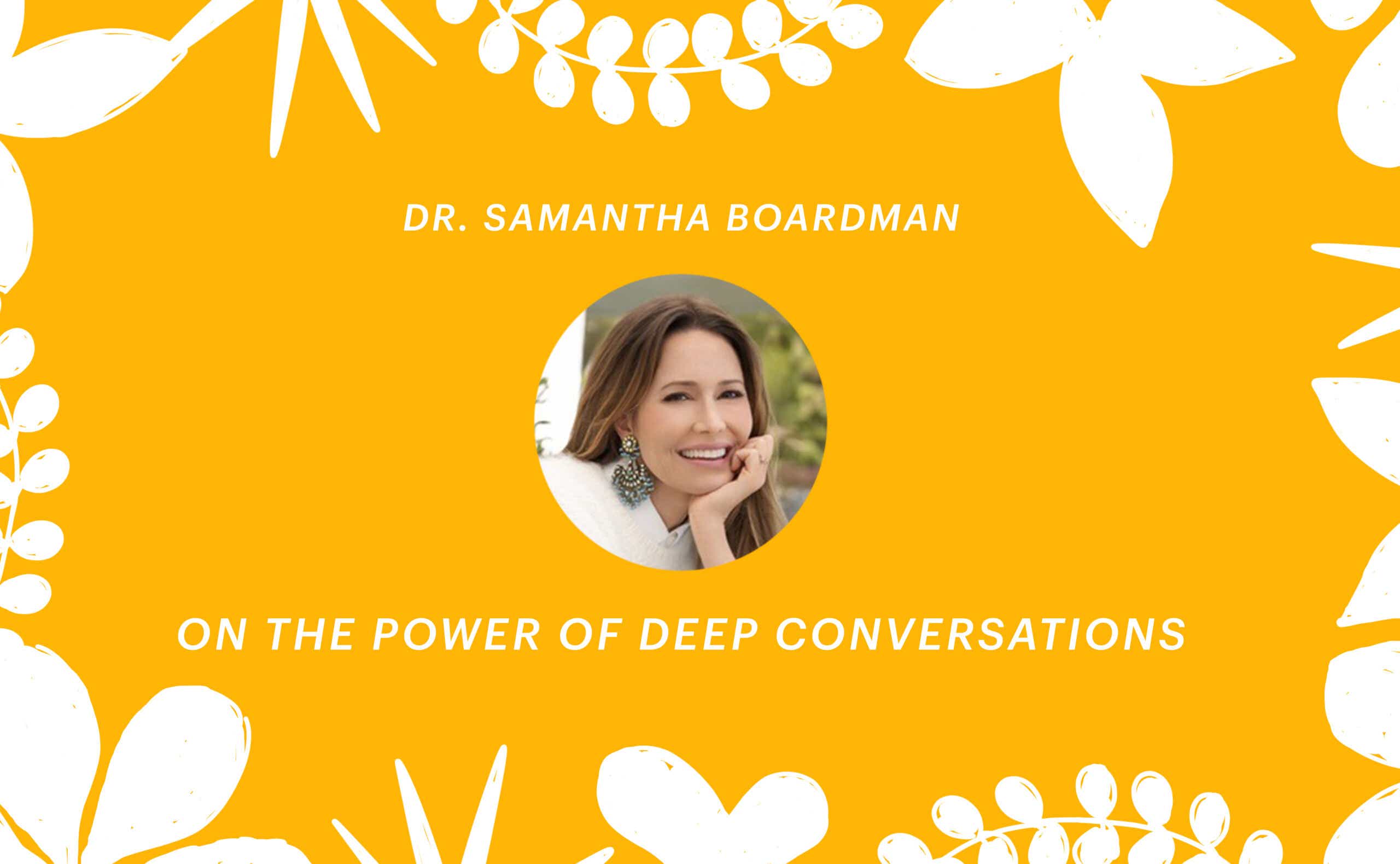Sometimes conversations flow easily — you sit down with a friend or loved one over a cup of coffee and re-energize with a long talk. Other times, you ask your kid what’s bothering them, and get a one-word answer. Or maybe you don’t know how to move beyond the mundane weather chatter with someone you’ve just met.
No matter your speaking style or habits, the truth is that our conversations do matter. They can even affect our well-being. Starting your day by yelling at your spouse, or mumbling curse words to the guy who cut you off in traffic, creates an emotional cloud that clings to us throughout the day. A key to living a happier, fuller life is to curate more meaningful, positive interactions, according to Dr. Suzanne Boardman, a psychiatrist and the author of Everyday Vitality.
Below, we asked her to explain the power of deep conversations — how to have them, why we sometimes avoid them, and the types of questions we should be asking to scratch below the surface level.
KCM: How do our daily conversations affect our mental health?
SB: Having conflict with anybody — especially with our loved ones — is a huge source of stress in our lives. When you leave the house in the morning and you’ve had negative interaction with your partner or your kids, or with a stranger fighting over a parking spot, it hangs over you.
There’s a lot of research that shows that in order to have a strong relationship with anybody, we need to have frequent positive interactions with somebody who cares about us. Whatever we can do to promote frequent positive interactions in our everyday lives is essential. That means having meaningful conversations — getting beyond logistics and the weather — and asking, “what’s really going on?”
How do you initiate more meaningful conversations?
The most essential element is listening: Looking up from your cell phone, being present, giving somebody your full attention and saying, “Tell me more.”
When a loved one or a friend comes and tells us, “What do you think about this?” or “Did you see that today?” oftentimes, we glance upward from the phone and then return to that kind of a grind. Like, “Oh cool. Anyways, this is what happened to me today.” We almost hijack the conversation. Instead, genuinely listen to what they’re saying without trying to come up with a response.
Why do people tend to avoid deeper conversations?
I think it’s uncomfortable to talk about feelings. Especially in our culture of positivity, people are a little afraid to have conversations that aren’t always positive. In the same way someone asks, “How are you?” you’re supposed to robotically respond, “Great, how are you?” Nobody really wants you to tell them what’s going on in their lives.
In many circumstances, that’s sort of a social norm. But for those who you’re close to, be unafraid to have candid conversations. Like saying, “This was hard,” or “That was awkward.” It’s so weird, especially right now, with re-entry. It’s as if everyone’s social muscles have atrophied. People are a little bit more vulnerable right now — maybe they can connect in a deeper way.
How has pandemic impacted the types of conversations we’re having as a culture?
People have experienced a lot of trauma during the pandemic. But there’s also people who feel that they’ve actually had some growth or positive changes in the wake of this difficult time.
There was this anticipation that there would be a tsunami of divorces and, for the most part, the data is suggesting that people have a renewed appreciation for their partner, feel closer to them, have deeper admiration, and are more satisfied with them. So if you’ve made any positive changes, how can you prioritize that going forward with your families and loved ones?
If you were speaking to your grandmother every week during quarantine, how do you maintain that? Is it that you’re going to be visiting her more often now? You don’t want to wait for another pandemic to make you press reset again.
What questions can we ask to make our conversations a little deeper?
First, create a safe space to have those conversations. Establish a place of trust, connection, and privacy. Here’s how to do that:
- Ask “what?” questions, not “why?” “Why?” questions usually give a brief answer. When we’re arguing with somebody, if you ask, “Why are you so upset?” they tend to get defensive and close down. Instead, use a question like, “What made you think that way?” You’re much more likely to open that person up to a comfortable and open conversation.
- Be curious. Expressing a certain degree of curiosity as to how somebody is processing something can be key to understanding. I’ve always found that questions rooted in real curiosity are a gold mine for conversation.
Can’t we just send a text message?
No, because there’s a loss of time in responding back-and-forth, and there’s not a shared presence. Connecting in person is best, but phone can also be really effective. Not on Zoom, ideally, since Zoom blends into our work lives and obligations and professional domains. Phone conversations, especially with people who are elderly who don’t feel comfortable using video chat can create an old-school connection that people feel very comfortable with.
Check out our conversations with Dr. Boardman on how to cultivate vitality and live life to the fullest.









